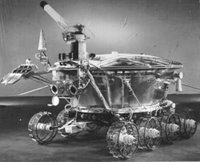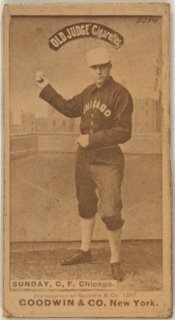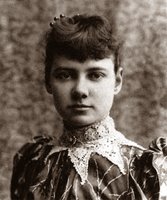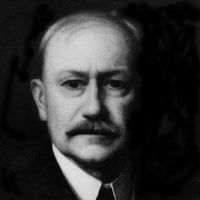
If there had been just a little more traffic, today’s entry would have had to appear tomorrow. At 10:00 p.m. GMT on the
15th in
1970, the
Soviet Spacecraft Luna 17 slipped in to orbit around the Moon. Carried onboard was the
Lunokhod 1, a really neat remote control car,which would land on the Moon on November 17. Actually, it was a bit too odd looking to be called a car. Calling it an RC car does get the point across though. Well, maybe not a car, it looked more like someone polished off all the Vodka in the liquor cabinet and then got in to the kids’ erector set. If you look at it very closely, it becomes clear that it was a
miniature laboratory. Maybe not the Dr. Frankenstein kind of laboratory, but a laboratory nonetheless. The Lunokhod 1’s significance, however, lies in the fact that it was
the first roving remote-controlled robot to land on a planetary body other than Earth. Perhaps I should qualify that by saying it was the first rover made by
Humans. That would be both accurate and leave the door open for new evidence that may be coming out of
Area 51 once everything there is de-classified.
 After a successful career, many professional baseball players may retire to lead lives of gentlemen farmers, hit the book and speaking circuits, or carry over their product endorsement contracts into private life after leaving the baseball diamond for good. Then there are those whose choose to leave their careers as athletes behind and take a completely different path. Have you ever wondered what the unsuccessful baseball players do? William Ashley Sunday, born on the 19th in 1862, was a baseball player in the latter part of the 19th century. He played with the Philadelphia Phillies, among other teams, and was not, by any stretch of the imagination, an exceptional player. He never hit well and his fielding was generally considered to be sub-par. On the field his only talent of note was running. As a runner he was incredibly fast, which apparently is a talent that comes in handy when playing baseball. During either the 1886 or 1887 seasons, on a day off, Sunday and his teammates were wandering around Chicago drinking beer and pretty much hanging out on street corners. At this point in the story of baseball, I guess this was the equivalent of totaling expensive cars, doing cocaine and steroids, and then trashing nightclubs and hotel rooms, hobbies so popular among athletes today. On one corner, the group encountered a bunch of street preachers from the Pacific Garden Mission. It may have been the preaching or, perhaps it was the beer, but whatever it was Sunday quite drinking for good and transformed himself in to Billy Sunday, self-styled evangelist. He would go on to achieve the fame and fortune that had eluded him as a baseball player.
After a successful career, many professional baseball players may retire to lead lives of gentlemen farmers, hit the book and speaking circuits, or carry over their product endorsement contracts into private life after leaving the baseball diamond for good. Then there are those whose choose to leave their careers as athletes behind and take a completely different path. Have you ever wondered what the unsuccessful baseball players do? William Ashley Sunday, born on the 19th in 1862, was a baseball player in the latter part of the 19th century. He played with the Philadelphia Phillies, among other teams, and was not, by any stretch of the imagination, an exceptional player. He never hit well and his fielding was generally considered to be sub-par. On the field his only talent of note was running. As a runner he was incredibly fast, which apparently is a talent that comes in handy when playing baseball. During either the 1886 or 1887 seasons, on a day off, Sunday and his teammates were wandering around Chicago drinking beer and pretty much hanging out on street corners. At this point in the story of baseball, I guess this was the equivalent of totaling expensive cars, doing cocaine and steroids, and then trashing nightclubs and hotel rooms, hobbies so popular among athletes today. On one corner, the group encountered a bunch of street preachers from the Pacific Garden Mission. It may have been the preaching or, perhaps it was the beer, but whatever it was Sunday quite drinking for good and transformed himself in to Billy Sunday, self-styled evangelist. He would go on to achieve the fame and fortune that had eluded him as a baseball player. 







